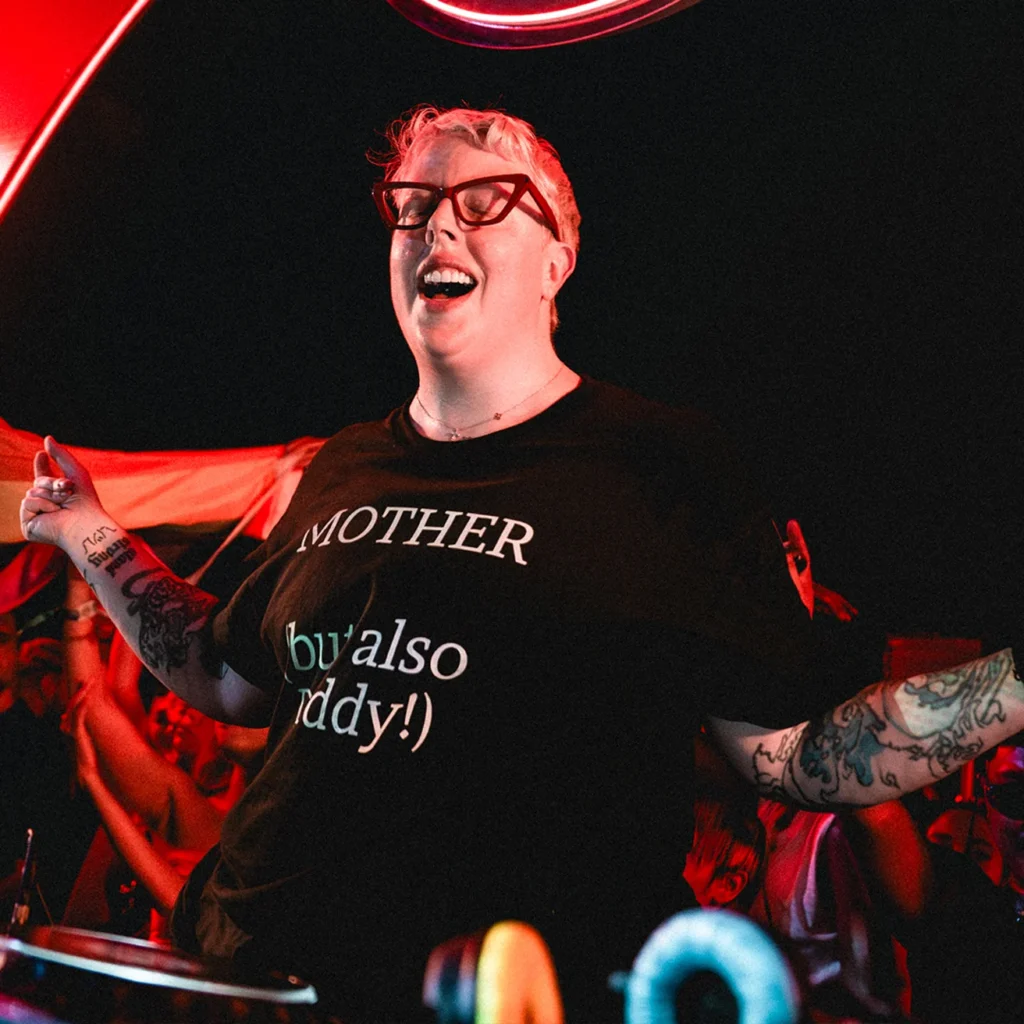On September 23, 2024, Marea Stamper—better known as DJ and producer The Blessed Madonna—is preparing for her upcoming Australian tour, a familiar ritual involving packing her belongings into well-worn suitcases.
Having played in iconic venues such as Berlin’s Berghain and headlining the Mojave stage at Coachella in 2022, this isn’t new territory for the legendary DJ.
Sipping on her iced coffee, she’s relaxed despite having recently undergone outpatient surgery for persistent anemia.
“They fixed me up just in time,” Stamper jokes, adding, “Otherwise, I would’ve died on this next tour.”
It’s no exaggeration to say that her absence would have been a major loss for the music world.
Stamper is one of the most celebrated DJs of her generation, known for shattering glass ceilings, including being named Mixmag’s DJ of the Year in 2016—the first woman to ever earn that honor.
This Australian tour fulfills a promise. Her previous trip was abruptly cut short by the COVID-19 pandemic, which left her scrambling to catch a last-minute flight home.
During the pandemic, with clubs closed, Stamper kept herself busy by remixing Future Nostalgia for Dua Lipa, resulting in an unexpected hit with Fred Again’s track Marea (We Lost Dancing), which sampled one of their conversations.
That serendipitous hit, along with her passion and talent, secured her a record deal with Warner Records.
This week, she releases her long-awaited debut album Godspeed, featuring collaborations with artists like Kylie Minogue, Joy Crookes, and Jamie Principle.
Born in 1977, Stamper grew up in rural Kentucky, far from the world’s dance capitals.
Her father, blues musician Mike Stamper, and her mother, a librarian, raised her in a modest household.
Being an outsider in high school, Stamper faced bullying over her “butch” style and bold looks.
She once got detention for not having lunch money and often skipped school to escape the daily torment.
Stamper’s salvation came from an unlikely source—an episode of Beverly Hills 90210 where the characters attended a rave.
At 14, she snuck into her first house party, discovering her true passion for music.
Despite her father’s disapproval, Stamper immersed herself in the underground rave scene, forging lifelong bonds with her fellow “rave degenerates.”
By age 16, she dropped out of school and began selling mixtapes out of her car, eventually landing DJ gigs in Chicago under the moniker Lady Foursquare. Later, she rebranded as The Black Madonna, releasing critically acclaimed tracks like Exodus and He Is The Voice I Hear.
Her career skyrocketed, leading to sold-out residencies and even her own radio station in Grand Theft Auto V.
Stamper’s work on her album started years ago, and it went through several rewrites, but one song remained consistent: We Still Believe, an ode to the rave culture that has shaped her life.
“The first version was recorded on a BlackBerry,” she laughs, highlighting how long ago the track was conceived.
Before including it on the album, she had to reclaim the rights from the independent label that originally released it.
After securing the rights, Stamper enlisted house music pioneer Jamie Principle to re-record the vocals, cementing the track as a love letter to dance music’s unifying power.
Principle also contributed to a spoken-word interlude on the album, reflecting on the corrupting influence of money on the music scene.
This theme of money’s impact on creativity is one Stamper hammers home in Godspeed. The album opens with a quote from Quincy Jones: “God walks out of the room when you’re thinking about money.”
Stamper clarifies, “It’s not about being anti-money. But you can’t go into the studio trying to make a record just for financial gain.”
In a music landscape where formulaic pop albums by stars like Katy Perry and Jennifer Lopez have struggled to connect, Stamper believes a “Nirvana moment” is coming, one that will sweep away the old guard in favor of authentic voices.
She praises artists like Charli XCX and Chappell Roan for bringing personal risk and storytelling back into pop music.
Her own album is a testament to this authenticity, weaving her struggles, faith, and history into the fabric of its tracks.
On the title track, she pays homage to friends and mentors she’s lost, including Chicago legend Jojo Baby and pioneering DJ Kelli Hand.
In an almost divine coincidence, she wrote the lyrics to the song in her sleep, rediscovering them just days before the album was due.
It became the title track on none other than Quincy Jones’s birthday.
“Sometimes, when you’re making art, God just winks at you,” Stamper reflects.
With Godspeed, The Blessed Madonna delivers a deeply personal and genre-defining album, embracing the heart of dance music while challenging the superficiality of today’s pop industry.
Her journey from Kentucky raves to global stardom is nothing short of remarkable—and the world is listening.
Also read: Lila Moss And Kate Moss Make Victoria’s Secret Fashion Show Debuts Together
